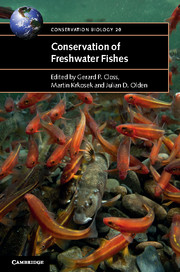Book contents
- Frontmatter
- Contents
- List of contributors
- Preface
- 1 Lost fishes, who is counting? The extent of the threat to freshwater fish biodiversity
- 2 Why are freshwater fish so threatened?
- 3 Climate change effects on freshwater fishes, conservation and management
- 4 Challenges and opportunities for fish conservation in dam-impacted waters
- 5 Chemical pollution
- 6 Multiple stressor effects on freshwater fish: a review and meta-analysis
- 7 Infectious disease and the conservation of freshwater fish
- 8 Non-indigenous fishes and their role in freshwater fish imperilment
- 9 Riparian management and the conservation of stream ecosystems and fishes
- 10 Fragmentation, connectivity and fish species persistence in freshwater ecosystems
- 11 Conservation of migratory fishes in freshwater ecosystems
- 12 Protecting apex predators
- 13 Artificial propagation of freshwater fishes: benefits and risks to recipient ecosystems from stocking, translocation and re-introduction
- 14 Freshwater conservation planning
- 15 Sustainable inland fisheries – perspectives from the recreational, commercial and subsistence sectors from around the globe
- 16 Understanding and conserving genetic diversity in a world dominated by alien introductions and native transfers: the case study of primary and peripheral freshwater fishes in southern Europe
- 17 Maintaining taxonomic skills; the decline of taxonomy – a threat to fish conservation
- 18 Synthesis – what is the future of freshwater fishes?
- Index
Preface
Published online by Cambridge University Press: 05 December 2015
- Frontmatter
- Contents
- List of contributors
- Preface
- 1 Lost fishes, who is counting? The extent of the threat to freshwater fish biodiversity
- 2 Why are freshwater fish so threatened?
- 3 Climate change effects on freshwater fishes, conservation and management
- 4 Challenges and opportunities for fish conservation in dam-impacted waters
- 5 Chemical pollution
- 6 Multiple stressor effects on freshwater fish: a review and meta-analysis
- 7 Infectious disease and the conservation of freshwater fish
- 8 Non-indigenous fishes and their role in freshwater fish imperilment
- 9 Riparian management and the conservation of stream ecosystems and fishes
- 10 Fragmentation, connectivity and fish species persistence in freshwater ecosystems
- 11 Conservation of migratory fishes in freshwater ecosystems
- 12 Protecting apex predators
- 13 Artificial propagation of freshwater fishes: benefits and risks to recipient ecosystems from stocking, translocation and re-introduction
- 14 Freshwater conservation planning
- 15 Sustainable inland fisheries – perspectives from the recreational, commercial and subsistence sectors from around the globe
- 16 Understanding and conserving genetic diversity in a world dominated by alien introductions and native transfers: the case study of primary and peripheral freshwater fishes in southern Europe
- 17 Maintaining taxonomic skills; the decline of taxonomy – a threat to fish conservation
- 18 Synthesis – what is the future of freshwater fishes?
- Index
Summary
Do unto those downstream as you would have those upstream do unto you.
Wendell BerryEarly naturalists Comte de Buffon, Alfred Russel Wallace and Charles Darwin inspired famous ideas of change in life, but also revealed the range of life distributed across the Earth. Some species are known from only a single location, whereas others occur high to low, east to west, or poles to the tropics. Freshwater fishes exemplify this phenomenon. High diversity and endemism stem largely from the fact that fresh waters are embedded within a terrestrial landscape that limits large-distance movement among drainage basins. This constrained geography is at least partially responsible for the fantastic diversity of freshwater fishes seen around the world, and the magnificent differences in regional faunas ranging from the Neotropics to the Palearctic.
Equally impressive is how humanity's migrations across, and subsequent modification of, the landscape have had innumerable effects on the many organisms with which we share this world. Quite simply, the human enterprise is nothing short of gigantic, and as a result, freshwaters are subject to a plethora of anthropogenic threats, including habitat loss and modification, dams and fragmentation, climate change, overexploitation, pollution and the spread of invasive species. It is quite telling that humans now appropriate over half the available freshwater run-off, reservoirs trap a quarter of the global sediment load before it reaches the oceans, river systems have been fragmented by over one million dams globally, and many inland waters are polluted and their fisheries persistently over-harvested. The damage of these and many other insults is that freshwater fishes are among the most imperilled faunas worldwide.
So, have fishes had their chips? Scientific experts respond in the chapters that follow with an empathetic and resounding ‘NO’! Despite the enormity of the challenge, the pages of this book speak to hope and not despair. No matter how daunting the prospects, the Blue Planet crisis merely provides more opportunities for conservation success. We hope that the writings in this book inspire both current and future generations of scientists to roll up their sleeves and get to work to ensure a sustainable future for our freshwater fishes.
- Type
- Chapter
- Information
- Conservation of Freshwater Fishes , pp. xvii - xviiiPublisher: Cambridge University PressPrint publication year: 2015
- 1
- Cited by

